Corporate Governance and Accountability
VerifiedAdded on 2023/06/12
|15
|4312
|390
AI Summary
This essay discusses the significance of an effective corporate governance framework and its essential elements disclosure, transparency, and company accountability. It also discusses the implication of such essential elements on the societal stakeholders. The transparency and timely disclosure of financial reporting of a company is most important as such, information enables stakeholders to understand the financial condition of the company. The involvement of multinational corporations in corrupt practices like secrecy jurisdiction often causes evasion of tax, financial regulations, corporate governance rules, etc.
Contribute Materials
Your contribution can guide someone’s learning journey. Share your
documents today.
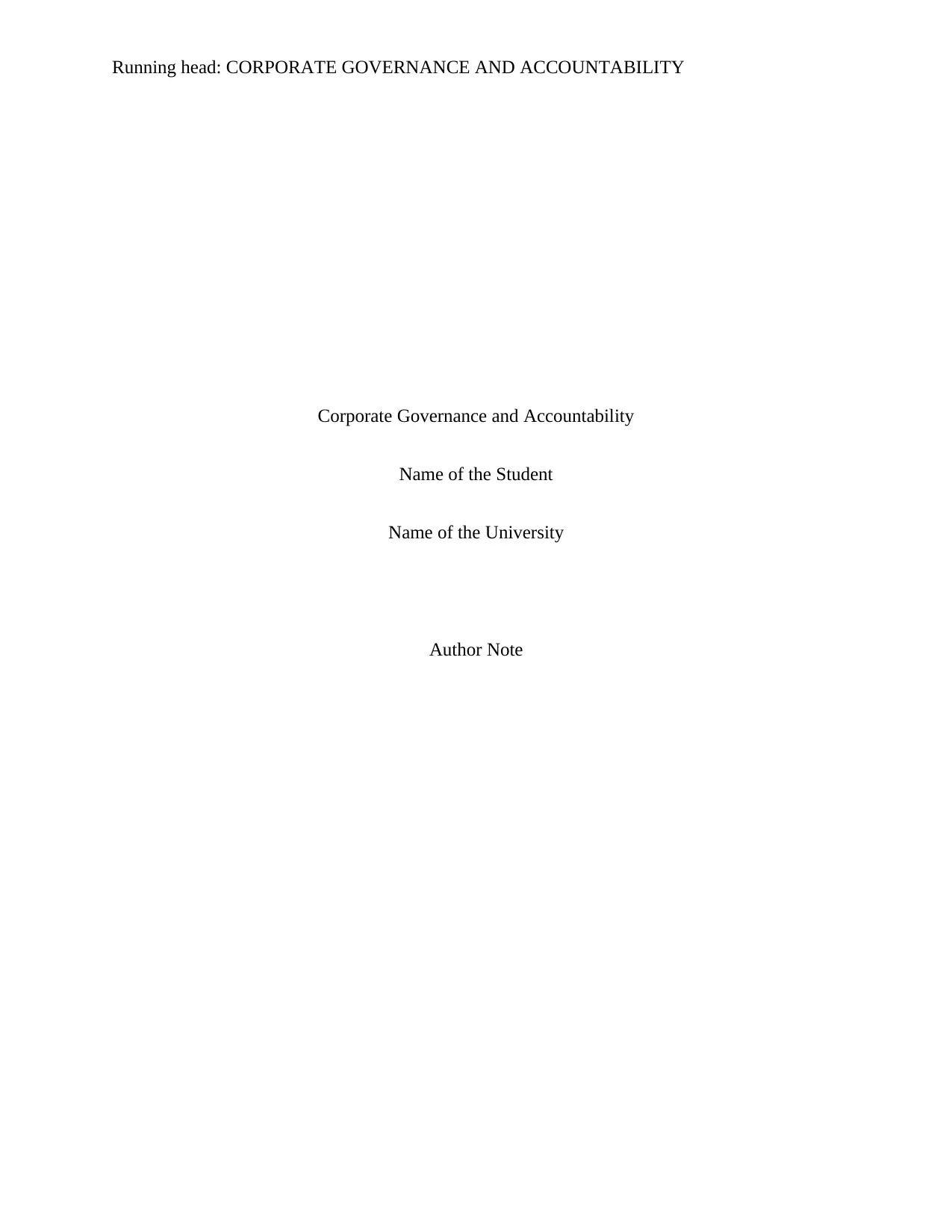
Running head: CORPORATE GOVERNANCE AND ACCOUNTABILITY
Corporate Governance and Accountability
Name of the Student
Name of the University
Author Note
Corporate Governance and Accountability
Name of the Student
Name of the University
Author Note
Secure Best Marks with AI Grader
Need help grading? Try our AI Grader for instant feedback on your assignments.
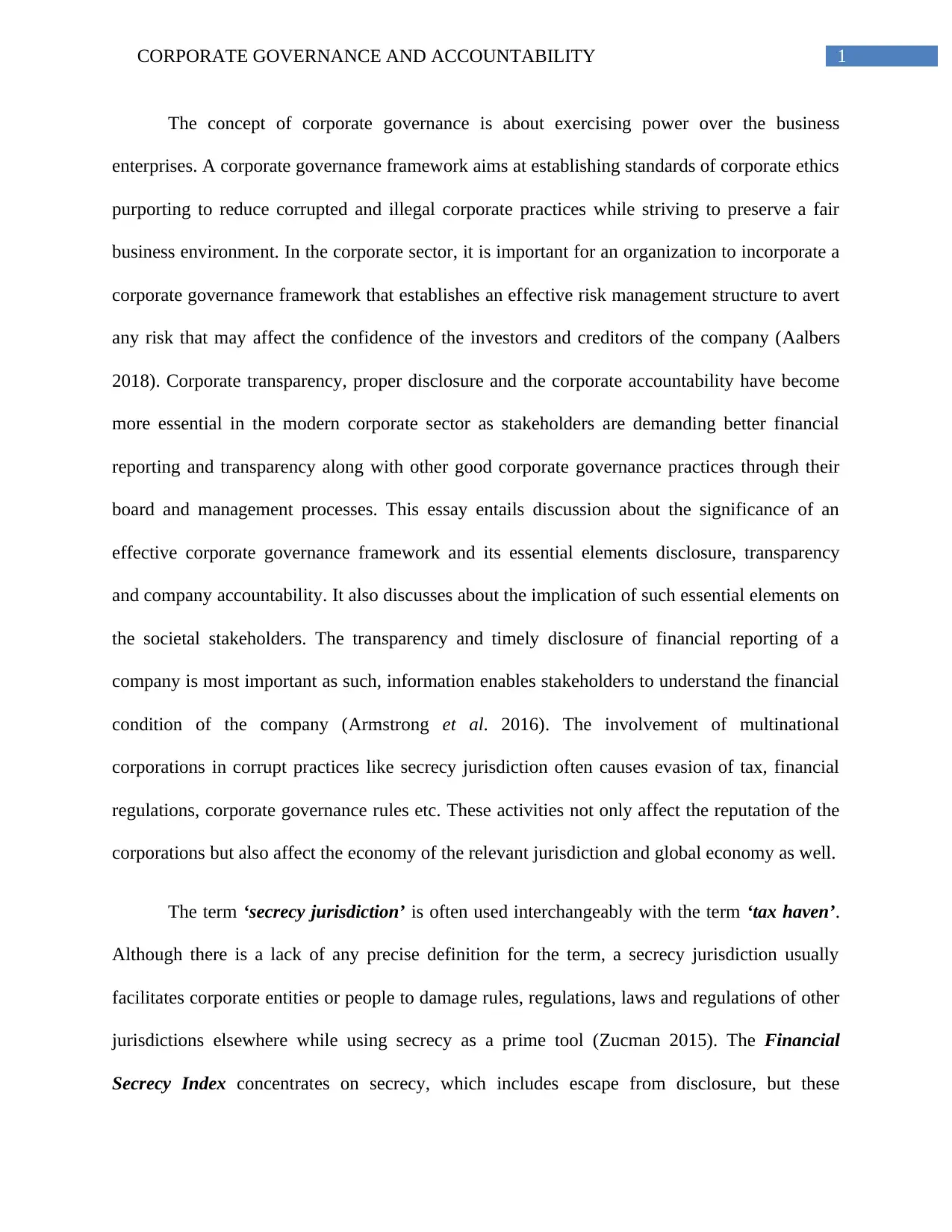
1CORPORATE GOVERNANCE AND ACCOUNTABILITY
The concept of corporate governance is about exercising power over the business
enterprises. A corporate governance framework aims at establishing standards of corporate ethics
purporting to reduce corrupted and illegal corporate practices while striving to preserve a fair
business environment. In the corporate sector, it is important for an organization to incorporate a
corporate governance framework that establishes an effective risk management structure to avert
any risk that may affect the confidence of the investors and creditors of the company (Aalbers
2018). Corporate transparency, proper disclosure and the corporate accountability have become
more essential in the modern corporate sector as stakeholders are demanding better financial
reporting and transparency along with other good corporate governance practices through their
board and management processes. This essay entails discussion about the significance of an
effective corporate governance framework and its essential elements disclosure, transparency
and company accountability. It also discusses about the implication of such essential elements on
the societal stakeholders. The transparency and timely disclosure of financial reporting of a
company is most important as such, information enables stakeholders to understand the financial
condition of the company (Armstrong et al. 2016). The involvement of multinational
corporations in corrupt practices like secrecy jurisdiction often causes evasion of tax, financial
regulations, corporate governance rules etc. These activities not only affect the reputation of the
corporations but also affect the economy of the relevant jurisdiction and global economy as well.
The term ‘secrecy jurisdiction’ is often used interchangeably with the term ‘tax haven’.
Although there is a lack of any precise definition for the term, a secrecy jurisdiction usually
facilitates corporate entities or people to damage rules, regulations, laws and regulations of other
jurisdictions elsewhere while using secrecy as a prime tool (Zucman 2015). The Financial
Secrecy Index concentrates on secrecy, which includes escape from disclosure, but these
The concept of corporate governance is about exercising power over the business
enterprises. A corporate governance framework aims at establishing standards of corporate ethics
purporting to reduce corrupted and illegal corporate practices while striving to preserve a fair
business environment. In the corporate sector, it is important for an organization to incorporate a
corporate governance framework that establishes an effective risk management structure to avert
any risk that may affect the confidence of the investors and creditors of the company (Aalbers
2018). Corporate transparency, proper disclosure and the corporate accountability have become
more essential in the modern corporate sector as stakeholders are demanding better financial
reporting and transparency along with other good corporate governance practices through their
board and management processes. This essay entails discussion about the significance of an
effective corporate governance framework and its essential elements disclosure, transparency
and company accountability. It also discusses about the implication of such essential elements on
the societal stakeholders. The transparency and timely disclosure of financial reporting of a
company is most important as such, information enables stakeholders to understand the financial
condition of the company (Armstrong et al. 2016). The involvement of multinational
corporations in corrupt practices like secrecy jurisdiction often causes evasion of tax, financial
regulations, corporate governance rules etc. These activities not only affect the reputation of the
corporations but also affect the economy of the relevant jurisdiction and global economy as well.
The term ‘secrecy jurisdiction’ is often used interchangeably with the term ‘tax haven’.
Although there is a lack of any precise definition for the term, a secrecy jurisdiction usually
facilitates corporate entities or people to damage rules, regulations, laws and regulations of other
jurisdictions elsewhere while using secrecy as a prime tool (Zucman 2015). The Financial
Secrecy Index concentrates on secrecy, which includes escape from disclosure, but these
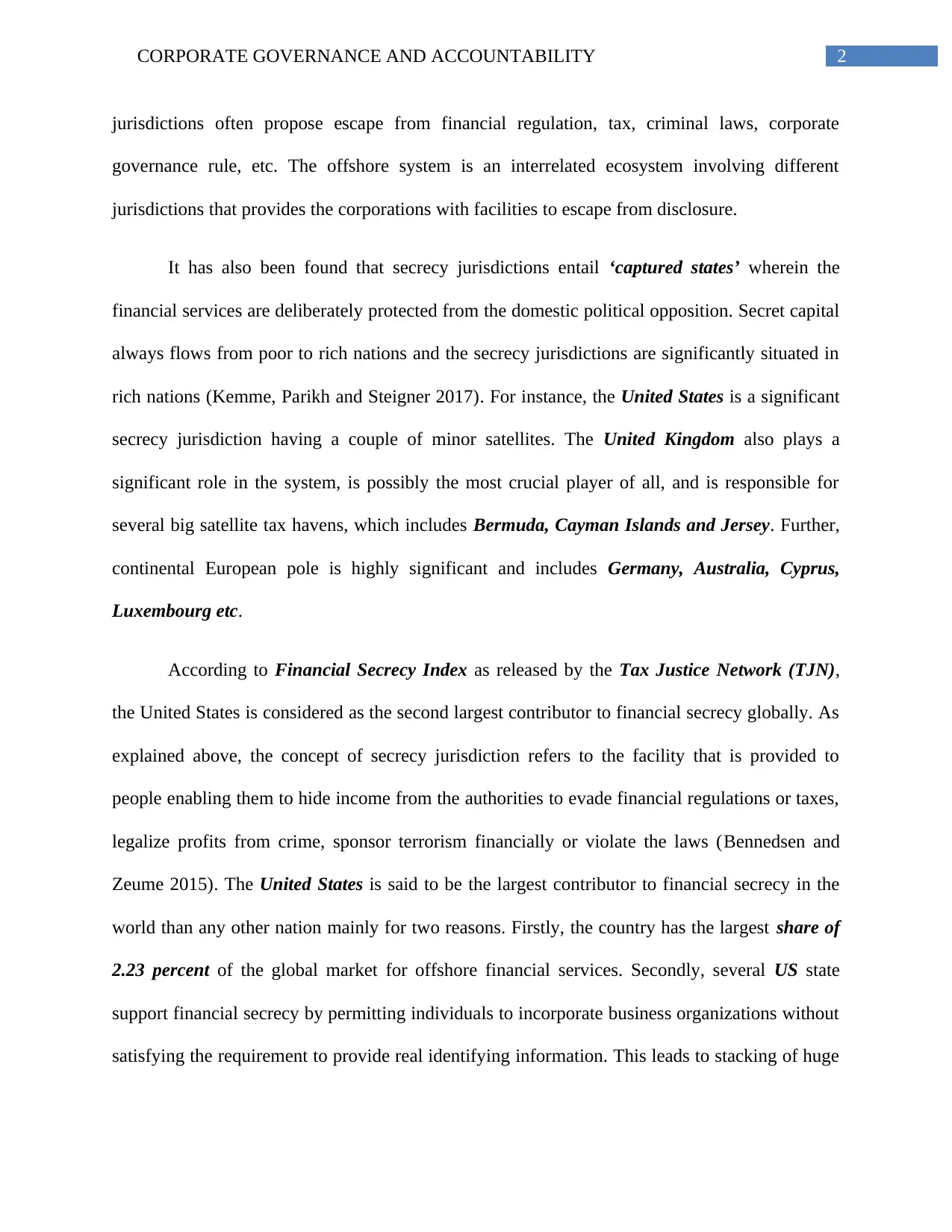
2CORPORATE GOVERNANCE AND ACCOUNTABILITY
jurisdictions often propose escape from financial regulation, tax, criminal laws, corporate
governance rule, etc. The offshore system is an interrelated ecosystem involving different
jurisdictions that provides the corporations with facilities to escape from disclosure.
It has also been found that secrecy jurisdictions entail ‘captured states’ wherein the
financial services are deliberately protected from the domestic political opposition. Secret capital
always flows from poor to rich nations and the secrecy jurisdictions are significantly situated in
rich nations (Kemme, Parikh and Steigner 2017). For instance, the United States is a significant
secrecy jurisdiction having a couple of minor satellites. The United Kingdom also plays a
significant role in the system, is possibly the most crucial player of all, and is responsible for
several big satellite tax havens, which includes Bermuda, Cayman Islands and Jersey. Further,
continental European pole is highly significant and includes Germany, Australia, Cyprus,
Luxembourg etc.
According to Financial Secrecy Index as released by the Tax Justice Network (TJN),
the United States is considered as the second largest contributor to financial secrecy globally. As
explained above, the concept of secrecy jurisdiction refers to the facility that is provided to
people enabling them to hide income from the authorities to evade financial regulations or taxes,
legalize profits from crime, sponsor terrorism financially or violate the laws (Bennedsen and
Zeume 2015). The United States is said to be the largest contributor to financial secrecy in the
world than any other nation mainly for two reasons. Firstly, the country has the largest share of
2.23 percent of the global market for offshore financial services. Secondly, several US state
support financial secrecy by permitting individuals to incorporate business organizations without
satisfying the requirement to provide real identifying information. This leads to stacking of huge
jurisdictions often propose escape from financial regulation, tax, criminal laws, corporate
governance rule, etc. The offshore system is an interrelated ecosystem involving different
jurisdictions that provides the corporations with facilities to escape from disclosure.
It has also been found that secrecy jurisdictions entail ‘captured states’ wherein the
financial services are deliberately protected from the domestic political opposition. Secret capital
always flows from poor to rich nations and the secrecy jurisdictions are significantly situated in
rich nations (Kemme, Parikh and Steigner 2017). For instance, the United States is a significant
secrecy jurisdiction having a couple of minor satellites. The United Kingdom also plays a
significant role in the system, is possibly the most crucial player of all, and is responsible for
several big satellite tax havens, which includes Bermuda, Cayman Islands and Jersey. Further,
continental European pole is highly significant and includes Germany, Australia, Cyprus,
Luxembourg etc.
According to Financial Secrecy Index as released by the Tax Justice Network (TJN),
the United States is considered as the second largest contributor to financial secrecy globally. As
explained above, the concept of secrecy jurisdiction refers to the facility that is provided to
people enabling them to hide income from the authorities to evade financial regulations or taxes,
legalize profits from crime, sponsor terrorism financially or violate the laws (Bennedsen and
Zeume 2015). The United States is said to be the largest contributor to financial secrecy in the
world than any other nation mainly for two reasons. Firstly, the country has the largest share of
2.23 percent of the global market for offshore financial services. Secondly, several US state
support financial secrecy by permitting individuals to incorporate business organizations without
satisfying the requirement to provide real identifying information. This leads to stacking of huge
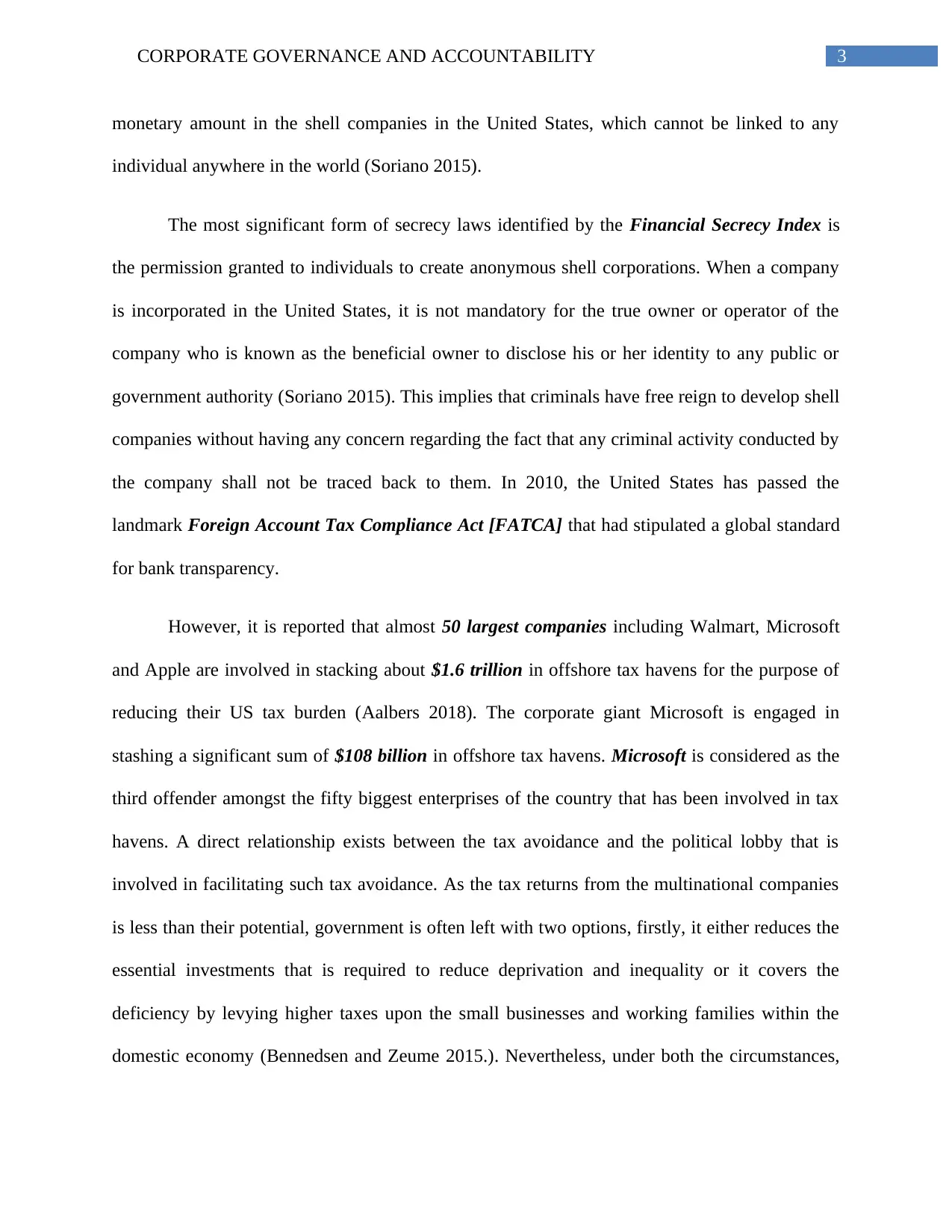
3CORPORATE GOVERNANCE AND ACCOUNTABILITY
monetary amount in the shell companies in the United States, which cannot be linked to any
individual anywhere in the world (Soriano 2015).
The most significant form of secrecy laws identified by the Financial Secrecy Index is
the permission granted to individuals to create anonymous shell corporations. When a company
is incorporated in the United States, it is not mandatory for the true owner or operator of the
company who is known as the beneficial owner to disclose his or her identity to any public or
government authority (Soriano 2015). This implies that criminals have free reign to develop shell
companies without having any concern regarding the fact that any criminal activity conducted by
the company shall not be traced back to them. In 2010, the United States has passed the
landmark Foreign Account Tax Compliance Act [FATCA] that had stipulated a global standard
for bank transparency.
However, it is reported that almost 50 largest companies including Walmart, Microsoft
and Apple are involved in stacking about $1.6 trillion in offshore tax havens for the purpose of
reducing their US tax burden (Aalbers 2018). The corporate giant Microsoft is engaged in
stashing a significant sum of $108 billion in offshore tax havens. Microsoft is considered as the
third offender amongst the fifty biggest enterprises of the country that has been involved in tax
havens. A direct relationship exists between the tax avoidance and the political lobby that is
involved in facilitating such tax avoidance. As the tax returns from the multinational companies
is less than their potential, government is often left with two options, firstly, it either reduces the
essential investments that is required to reduce deprivation and inequality or it covers the
deficiency by levying higher taxes upon the small businesses and working families within the
domestic economy (Bennedsen and Zeume 2015.). Nevertheless, under both the circumstances,
monetary amount in the shell companies in the United States, which cannot be linked to any
individual anywhere in the world (Soriano 2015).
The most significant form of secrecy laws identified by the Financial Secrecy Index is
the permission granted to individuals to create anonymous shell corporations. When a company
is incorporated in the United States, it is not mandatory for the true owner or operator of the
company who is known as the beneficial owner to disclose his or her identity to any public or
government authority (Soriano 2015). This implies that criminals have free reign to develop shell
companies without having any concern regarding the fact that any criminal activity conducted by
the company shall not be traced back to them. In 2010, the United States has passed the
landmark Foreign Account Tax Compliance Act [FATCA] that had stipulated a global standard
for bank transparency.
However, it is reported that almost 50 largest companies including Walmart, Microsoft
and Apple are involved in stacking about $1.6 trillion in offshore tax havens for the purpose of
reducing their US tax burden (Aalbers 2018). The corporate giant Microsoft is engaged in
stashing a significant sum of $108 billion in offshore tax havens. Microsoft is considered as the
third offender amongst the fifty biggest enterprises of the country that has been involved in tax
havens. A direct relationship exists between the tax avoidance and the political lobby that is
involved in facilitating such tax avoidance. As the tax returns from the multinational companies
is less than their potential, government is often left with two options, firstly, it either reduces the
essential investments that is required to reduce deprivation and inequality or it covers the
deficiency by levying higher taxes upon the small businesses and working families within the
domestic economy (Bennedsen and Zeume 2015.). Nevertheless, under both the circumstances,
Secure Best Marks with AI Grader
Need help grading? Try our AI Grader for instant feedback on your assignments.
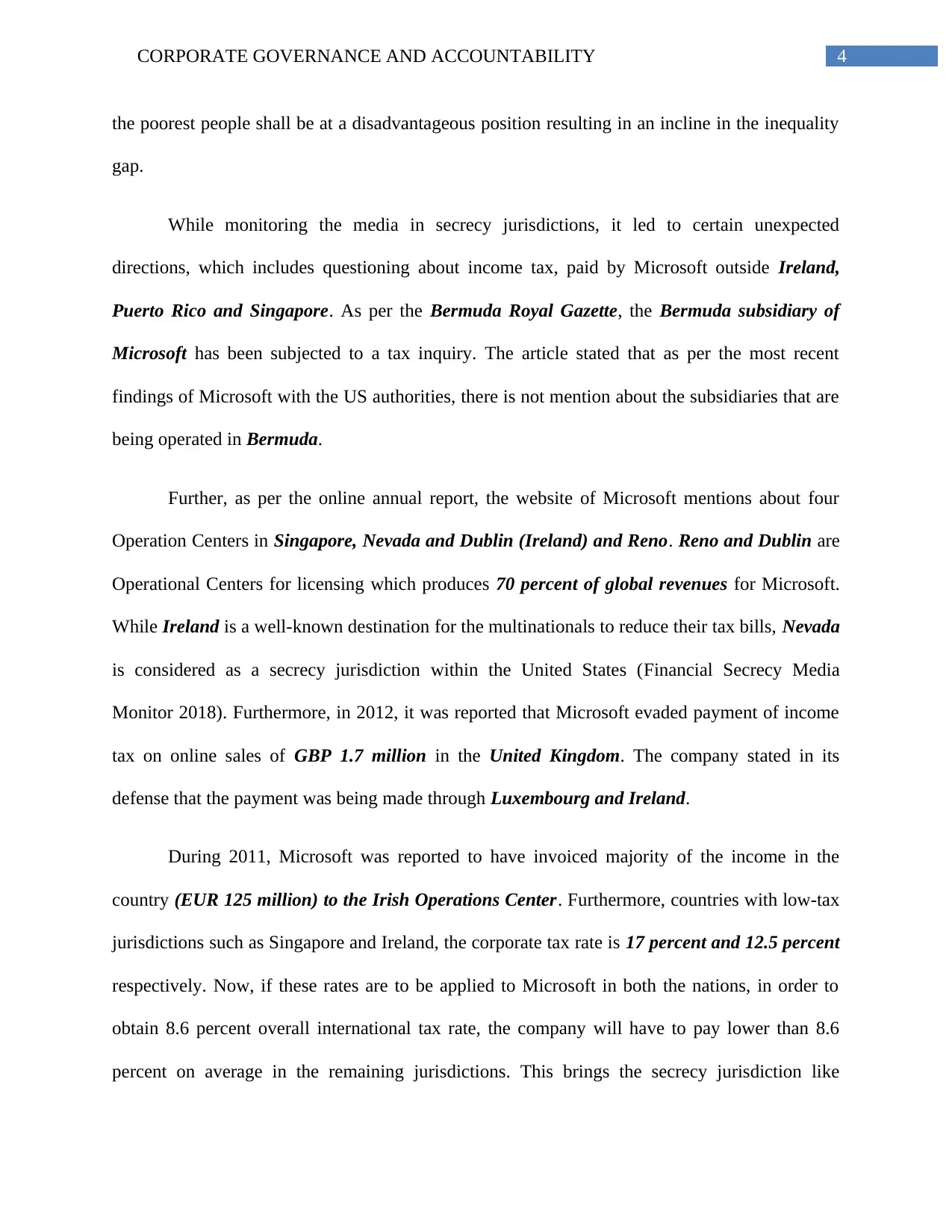
4CORPORATE GOVERNANCE AND ACCOUNTABILITY
the poorest people shall be at a disadvantageous position resulting in an incline in the inequality
gap.
While monitoring the media in secrecy jurisdictions, it led to certain unexpected
directions, which includes questioning about income tax, paid by Microsoft outside Ireland,
Puerto Rico and Singapore. As per the Bermuda Royal Gazette, the Bermuda subsidiary of
Microsoft has been subjected to a tax inquiry. The article stated that as per the most recent
findings of Microsoft with the US authorities, there is not mention about the subsidiaries that are
being operated in Bermuda.
Further, as per the online annual report, the website of Microsoft mentions about four
Operation Centers in Singapore, Nevada and Dublin (Ireland) and Reno. Reno and Dublin are
Operational Centers for licensing which produces 70 percent of global revenues for Microsoft.
While Ireland is a well-known destination for the multinationals to reduce their tax bills, Nevada
is considered as a secrecy jurisdiction within the United States (Financial Secrecy Media
Monitor 2018). Furthermore, in 2012, it was reported that Microsoft evaded payment of income
tax on online sales of GBP 1.7 million in the United Kingdom. The company stated in its
defense that the payment was being made through Luxembourg and Ireland.
During 2011, Microsoft was reported to have invoiced majority of the income in the
country (EUR 125 million) to the Irish Operations Center. Furthermore, countries with low-tax
jurisdictions such as Singapore and Ireland, the corporate tax rate is 17 percent and 12.5 percent
respectively. Now, if these rates are to be applied to Microsoft in both the nations, in order to
obtain 8.6 percent overall international tax rate, the company will have to pay lower than 8.6
percent on average in the remaining jurisdictions. This brings the secrecy jurisdiction like
the poorest people shall be at a disadvantageous position resulting in an incline in the inequality
gap.
While monitoring the media in secrecy jurisdictions, it led to certain unexpected
directions, which includes questioning about income tax, paid by Microsoft outside Ireland,
Puerto Rico and Singapore. As per the Bermuda Royal Gazette, the Bermuda subsidiary of
Microsoft has been subjected to a tax inquiry. The article stated that as per the most recent
findings of Microsoft with the US authorities, there is not mention about the subsidiaries that are
being operated in Bermuda.
Further, as per the online annual report, the website of Microsoft mentions about four
Operation Centers in Singapore, Nevada and Dublin (Ireland) and Reno. Reno and Dublin are
Operational Centers for licensing which produces 70 percent of global revenues for Microsoft.
While Ireland is a well-known destination for the multinationals to reduce their tax bills, Nevada
is considered as a secrecy jurisdiction within the United States (Financial Secrecy Media
Monitor 2018). Furthermore, in 2012, it was reported that Microsoft evaded payment of income
tax on online sales of GBP 1.7 million in the United Kingdom. The company stated in its
defense that the payment was being made through Luxembourg and Ireland.
During 2011, Microsoft was reported to have invoiced majority of the income in the
country (EUR 125 million) to the Irish Operations Center. Furthermore, countries with low-tax
jurisdictions such as Singapore and Ireland, the corporate tax rate is 17 percent and 12.5 percent
respectively. Now, if these rates are to be applied to Microsoft in both the nations, in order to
obtain 8.6 percent overall international tax rate, the company will have to pay lower than 8.6
percent on average in the remaining jurisdictions. This brings the secrecy jurisdiction like
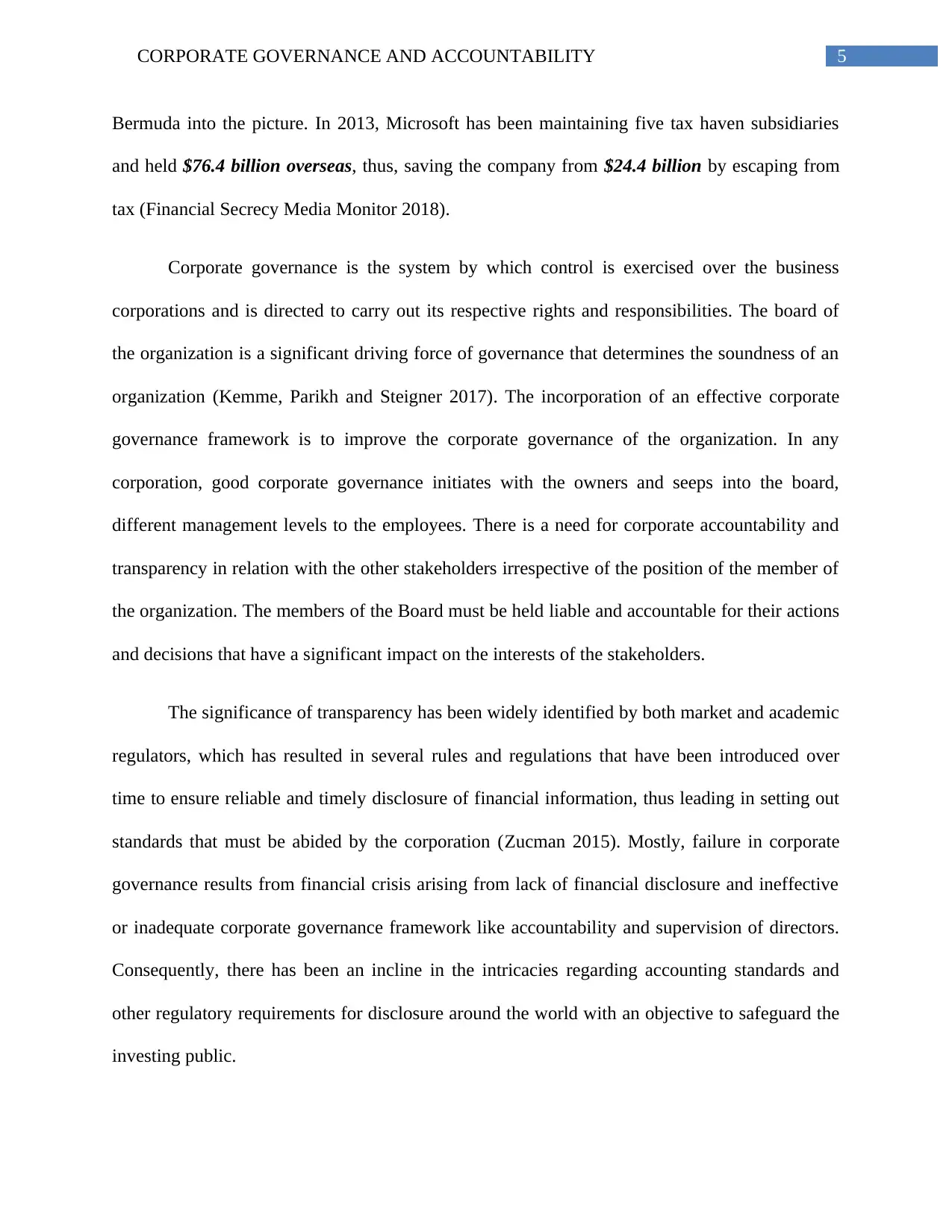
5CORPORATE GOVERNANCE AND ACCOUNTABILITY
Bermuda into the picture. In 2013, Microsoft has been maintaining five tax haven subsidiaries
and held $76.4 billion overseas, thus, saving the company from $24.4 billion by escaping from
tax (Financial Secrecy Media Monitor 2018).
Corporate governance is the system by which control is exercised over the business
corporations and is directed to carry out its respective rights and responsibilities. The board of
the organization is a significant driving force of governance that determines the soundness of an
organization (Kemme, Parikh and Steigner 2017). The incorporation of an effective corporate
governance framework is to improve the corporate governance of the organization. In any
corporation, good corporate governance initiates with the owners and seeps into the board,
different management levels to the employees. There is a need for corporate accountability and
transparency in relation with the other stakeholders irrespective of the position of the member of
the organization. The members of the Board must be held liable and accountable for their actions
and decisions that have a significant impact on the interests of the stakeholders.
The significance of transparency has been widely identified by both market and academic
regulators, which has resulted in several rules and regulations that have been introduced over
time to ensure reliable and timely disclosure of financial information, thus leading in setting out
standards that must be abided by the corporation (Zucman 2015). Mostly, failure in corporate
governance results from financial crisis arising from lack of financial disclosure and ineffective
or inadequate corporate governance framework like accountability and supervision of directors.
Consequently, there has been an incline in the intricacies regarding accounting standards and
other regulatory requirements for disclosure around the world with an objective to safeguard the
investing public.
Bermuda into the picture. In 2013, Microsoft has been maintaining five tax haven subsidiaries
and held $76.4 billion overseas, thus, saving the company from $24.4 billion by escaping from
tax (Financial Secrecy Media Monitor 2018).
Corporate governance is the system by which control is exercised over the business
corporations and is directed to carry out its respective rights and responsibilities. The board of
the organization is a significant driving force of governance that determines the soundness of an
organization (Kemme, Parikh and Steigner 2017). The incorporation of an effective corporate
governance framework is to improve the corporate governance of the organization. In any
corporation, good corporate governance initiates with the owners and seeps into the board,
different management levels to the employees. There is a need for corporate accountability and
transparency in relation with the other stakeholders irrespective of the position of the member of
the organization. The members of the Board must be held liable and accountable for their actions
and decisions that have a significant impact on the interests of the stakeholders.
The significance of transparency has been widely identified by both market and academic
regulators, which has resulted in several rules and regulations that have been introduced over
time to ensure reliable and timely disclosure of financial information, thus leading in setting out
standards that must be abided by the corporation (Zucman 2015). Mostly, failure in corporate
governance results from financial crisis arising from lack of financial disclosure and ineffective
or inadequate corporate governance framework like accountability and supervision of directors.
Consequently, there has been an incline in the intricacies regarding accounting standards and
other regulatory requirements for disclosure around the world with an objective to safeguard the
investing public.
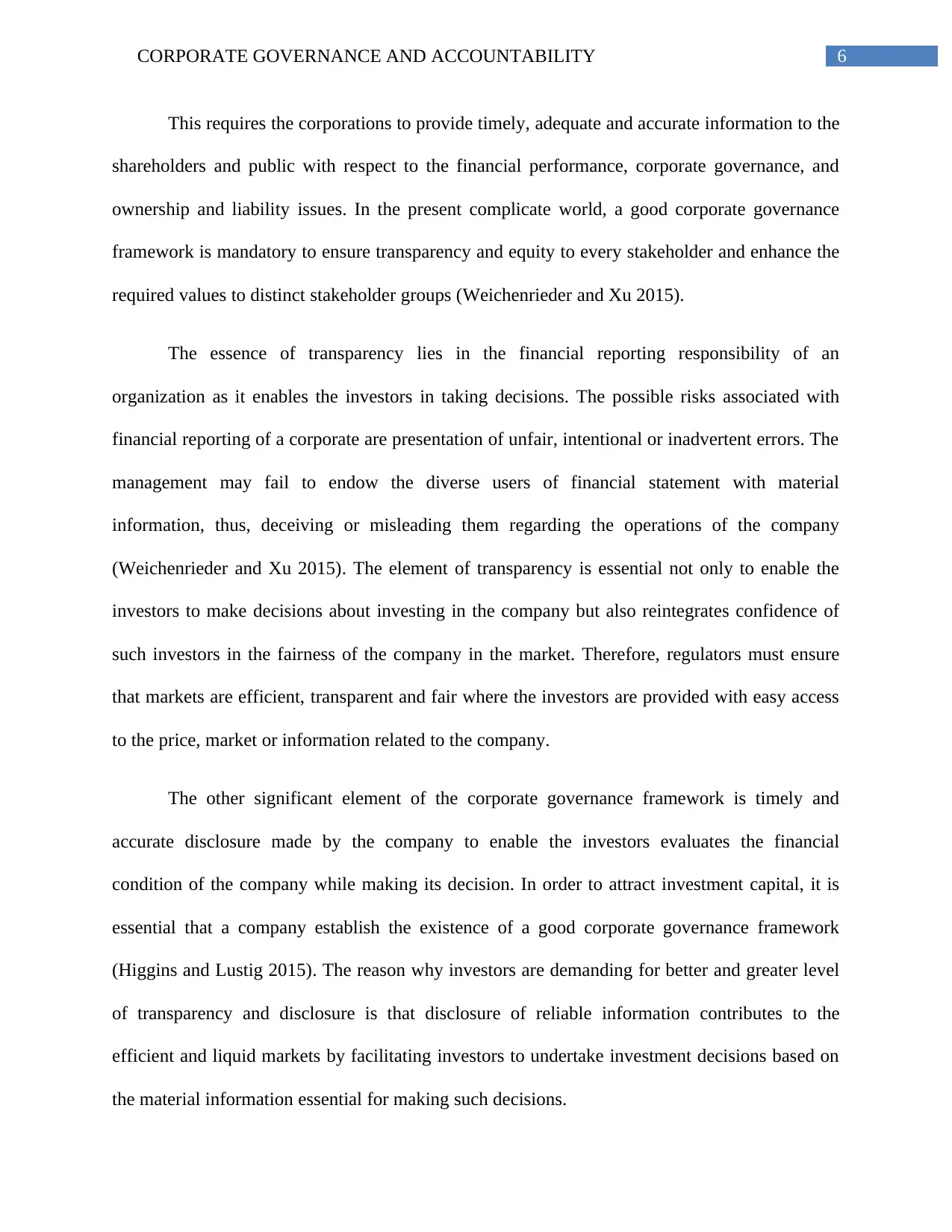
6CORPORATE GOVERNANCE AND ACCOUNTABILITY
This requires the corporations to provide timely, adequate and accurate information to the
shareholders and public with respect to the financial performance, corporate governance, and
ownership and liability issues. In the present complicate world, a good corporate governance
framework is mandatory to ensure transparency and equity to every stakeholder and enhance the
required values to distinct stakeholder groups (Weichenrieder and Xu 2015).
The essence of transparency lies in the financial reporting responsibility of an
organization as it enables the investors in taking decisions. The possible risks associated with
financial reporting of a corporate are presentation of unfair, intentional or inadvertent errors. The
management may fail to endow the diverse users of financial statement with material
information, thus, deceiving or misleading them regarding the operations of the company
(Weichenrieder and Xu 2015). The element of transparency is essential not only to enable the
investors to make decisions about investing in the company but also reintegrates confidence of
such investors in the fairness of the company in the market. Therefore, regulators must ensure
that markets are efficient, transparent and fair where the investors are provided with easy access
to the price, market or information related to the company.
The other significant element of the corporate governance framework is timely and
accurate disclosure made by the company to enable the investors evaluates the financial
condition of the company while making its decision. In order to attract investment capital, it is
essential that a company establish the existence of a good corporate governance framework
(Higgins and Lustig 2015). The reason why investors are demanding for better and greater level
of transparency and disclosure is that disclosure of reliable information contributes to the
efficient and liquid markets by facilitating investors to undertake investment decisions based on
the material information essential for making such decisions.
This requires the corporations to provide timely, adequate and accurate information to the
shareholders and public with respect to the financial performance, corporate governance, and
ownership and liability issues. In the present complicate world, a good corporate governance
framework is mandatory to ensure transparency and equity to every stakeholder and enhance the
required values to distinct stakeholder groups (Weichenrieder and Xu 2015).
The essence of transparency lies in the financial reporting responsibility of an
organization as it enables the investors in taking decisions. The possible risks associated with
financial reporting of a corporate are presentation of unfair, intentional or inadvertent errors. The
management may fail to endow the diverse users of financial statement with material
information, thus, deceiving or misleading them regarding the operations of the company
(Weichenrieder and Xu 2015). The element of transparency is essential not only to enable the
investors to make decisions about investing in the company but also reintegrates confidence of
such investors in the fairness of the company in the market. Therefore, regulators must ensure
that markets are efficient, transparent and fair where the investors are provided with easy access
to the price, market or information related to the company.
The other significant element of the corporate governance framework is timely and
accurate disclosure made by the company to enable the investors evaluates the financial
condition of the company while making its decision. In order to attract investment capital, it is
essential that a company establish the existence of a good corporate governance framework
(Higgins and Lustig 2015). The reason why investors are demanding for better and greater level
of transparency and disclosure is that disclosure of reliable information contributes to the
efficient and liquid markets by facilitating investors to undertake investment decisions based on
the material information essential for making such decisions.
Paraphrase This Document
Need a fresh take? Get an instant paraphrase of this document with our AI Paraphraser
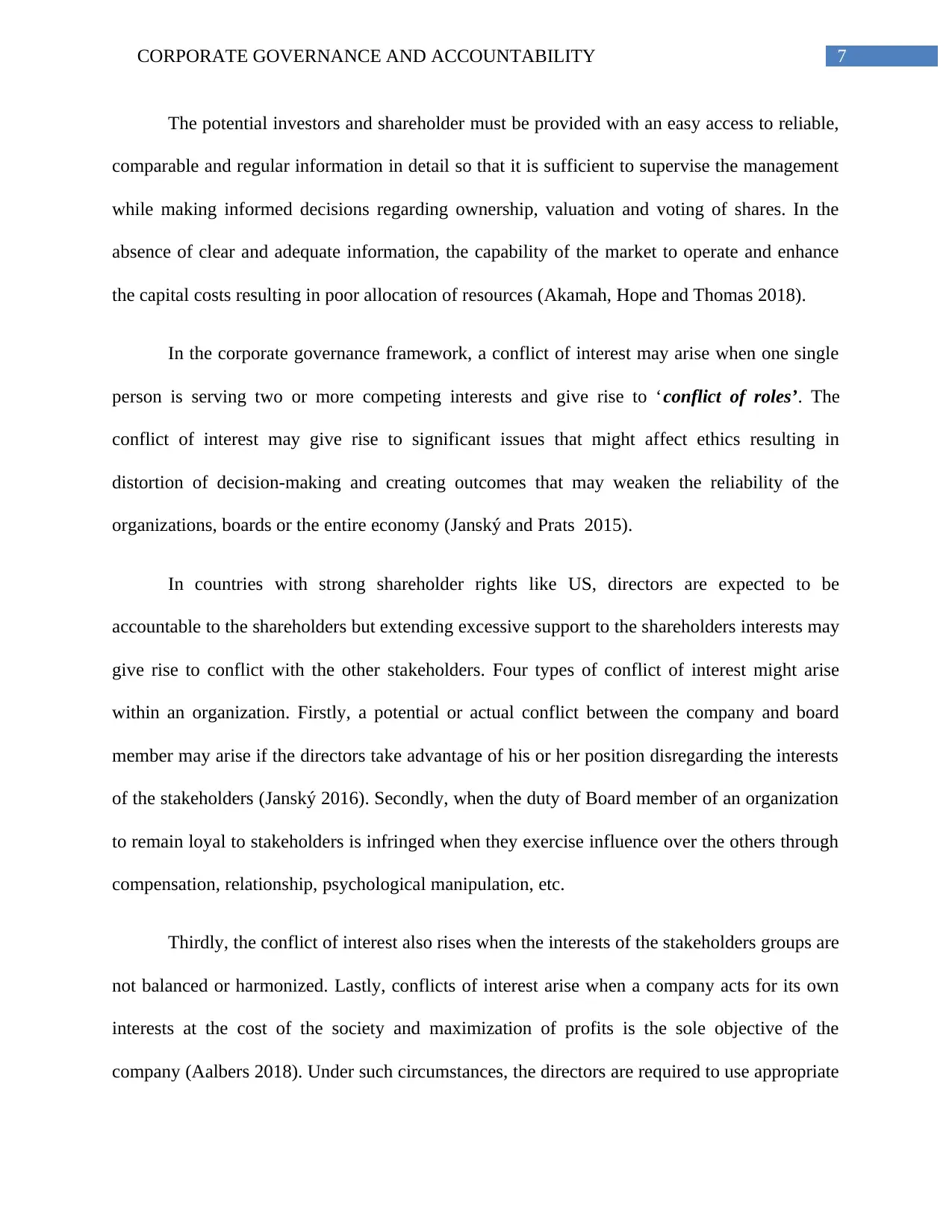
7CORPORATE GOVERNANCE AND ACCOUNTABILITY
The potential investors and shareholder must be provided with an easy access to reliable,
comparable and regular information in detail so that it is sufficient to supervise the management
while making informed decisions regarding ownership, valuation and voting of shares. In the
absence of clear and adequate information, the capability of the market to operate and enhance
the capital costs resulting in poor allocation of resources (Akamah, Hope and Thomas 2018).
In the corporate governance framework, a conflict of interest may arise when one single
person is serving two or more competing interests and give rise to ‘conflict of roles’. The
conflict of interest may give rise to significant issues that might affect ethics resulting in
distortion of decision-making and creating outcomes that may weaken the reliability of the
organizations, boards or the entire economy (Janský and Prats 2015).
In countries with strong shareholder rights like US, directors are expected to be
accountable to the shareholders but extending excessive support to the shareholders interests may
give rise to conflict with the other stakeholders. Four types of conflict of interest might arise
within an organization. Firstly, a potential or actual conflict between the company and board
member may arise if the directors take advantage of his or her position disregarding the interests
of the stakeholders (Janský 2016). Secondly, when the duty of Board member of an organization
to remain loyal to stakeholders is infringed when they exercise influence over the others through
compensation, relationship, psychological manipulation, etc.
Thirdly, the conflict of interest also rises when the interests of the stakeholders groups are
not balanced or harmonized. Lastly, conflicts of interest arise when a company acts for its own
interests at the cost of the society and maximization of profits is the sole objective of the
company (Aalbers 2018). Under such circumstances, the directors are required to use appropriate
The potential investors and shareholder must be provided with an easy access to reliable,
comparable and regular information in detail so that it is sufficient to supervise the management
while making informed decisions regarding ownership, valuation and voting of shares. In the
absence of clear and adequate information, the capability of the market to operate and enhance
the capital costs resulting in poor allocation of resources (Akamah, Hope and Thomas 2018).
In the corporate governance framework, a conflict of interest may arise when one single
person is serving two or more competing interests and give rise to ‘conflict of roles’. The
conflict of interest may give rise to significant issues that might affect ethics resulting in
distortion of decision-making and creating outcomes that may weaken the reliability of the
organizations, boards or the entire economy (Janský and Prats 2015).
In countries with strong shareholder rights like US, directors are expected to be
accountable to the shareholders but extending excessive support to the shareholders interests may
give rise to conflict with the other stakeholders. Four types of conflict of interest might arise
within an organization. Firstly, a potential or actual conflict between the company and board
member may arise if the directors take advantage of his or her position disregarding the interests
of the stakeholders (Janský 2016). Secondly, when the duty of Board member of an organization
to remain loyal to stakeholders is infringed when they exercise influence over the others through
compensation, relationship, psychological manipulation, etc.
Thirdly, the conflict of interest also rises when the interests of the stakeholders groups are
not balanced or harmonized. Lastly, conflicts of interest arise when a company acts for its own
interests at the cost of the society and maximization of profits is the sole objective of the
company (Aalbers 2018). Under such circumstances, the directors are required to use appropriate
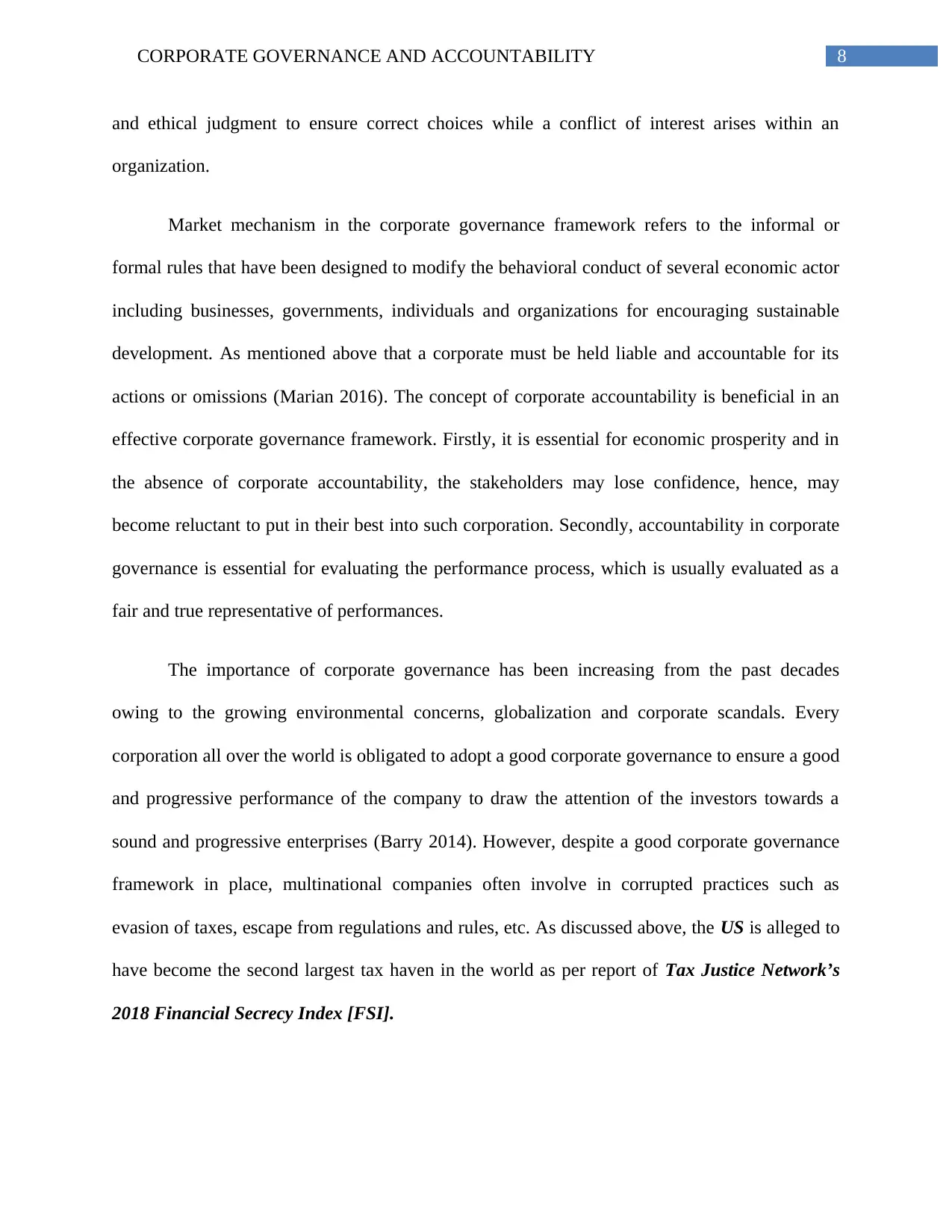
8CORPORATE GOVERNANCE AND ACCOUNTABILITY
and ethical judgment to ensure correct choices while a conflict of interest arises within an
organization.
Market mechanism in the corporate governance framework refers to the informal or
formal rules that have been designed to modify the behavioral conduct of several economic actor
including businesses, governments, individuals and organizations for encouraging sustainable
development. As mentioned above that a corporate must be held liable and accountable for its
actions or omissions (Marian 2016). The concept of corporate accountability is beneficial in an
effective corporate governance framework. Firstly, it is essential for economic prosperity and in
the absence of corporate accountability, the stakeholders may lose confidence, hence, may
become reluctant to put in their best into such corporation. Secondly, accountability in corporate
governance is essential for evaluating the performance process, which is usually evaluated as a
fair and true representative of performances.
The importance of corporate governance has been increasing from the past decades
owing to the growing environmental concerns, globalization and corporate scandals. Every
corporation all over the world is obligated to adopt a good corporate governance to ensure a good
and progressive performance of the company to draw the attention of the investors towards a
sound and progressive enterprises (Barry 2014). However, despite a good corporate governance
framework in place, multinational companies often involve in corrupted practices such as
evasion of taxes, escape from regulations and rules, etc. As discussed above, the US is alleged to
have become the second largest tax haven in the world as per report of Tax Justice Network’s
2018 Financial Secrecy Index [FSI].
and ethical judgment to ensure correct choices while a conflict of interest arises within an
organization.
Market mechanism in the corporate governance framework refers to the informal or
formal rules that have been designed to modify the behavioral conduct of several economic actor
including businesses, governments, individuals and organizations for encouraging sustainable
development. As mentioned above that a corporate must be held liable and accountable for its
actions or omissions (Marian 2016). The concept of corporate accountability is beneficial in an
effective corporate governance framework. Firstly, it is essential for economic prosperity and in
the absence of corporate accountability, the stakeholders may lose confidence, hence, may
become reluctant to put in their best into such corporation. Secondly, accountability in corporate
governance is essential for evaluating the performance process, which is usually evaluated as a
fair and true representative of performances.
The importance of corporate governance has been increasing from the past decades
owing to the growing environmental concerns, globalization and corporate scandals. Every
corporation all over the world is obligated to adopt a good corporate governance to ensure a good
and progressive performance of the company to draw the attention of the investors towards a
sound and progressive enterprises (Barry 2014). However, despite a good corporate governance
framework in place, multinational companies often involve in corrupted practices such as
evasion of taxes, escape from regulations and rules, etc. As discussed above, the US is alleged to
have become the second largest tax haven in the world as per report of Tax Justice Network’s
2018 Financial Secrecy Index [FSI].
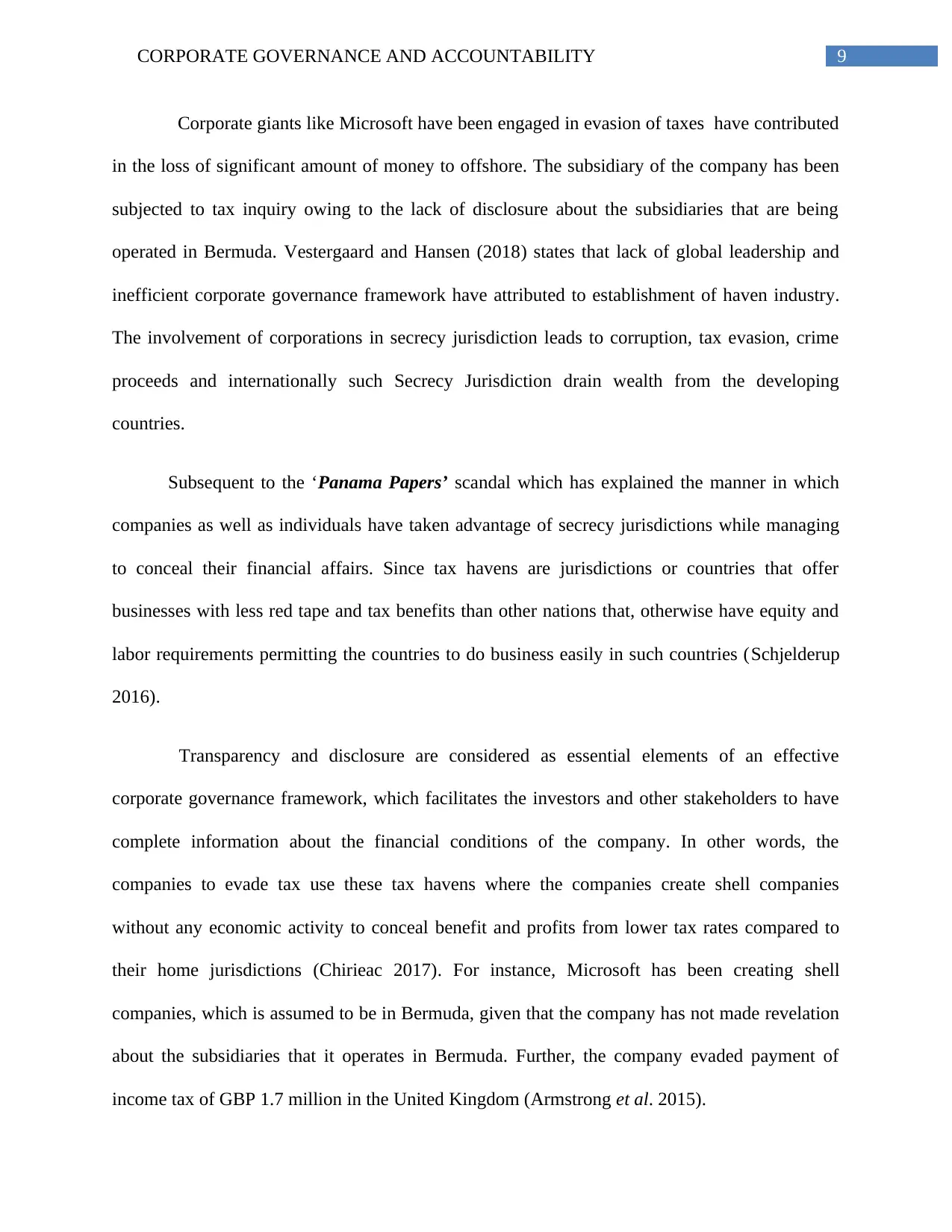
9CORPORATE GOVERNANCE AND ACCOUNTABILITY
Corporate giants like Microsoft have been engaged in evasion of taxes have contributed
in the loss of significant amount of money to offshore. The subsidiary of the company has been
subjected to tax inquiry owing to the lack of disclosure about the subsidiaries that are being
operated in Bermuda. Vestergaard and Hansen (2018) states that lack of global leadership and
inefficient corporate governance framework have attributed to establishment of haven industry.
The involvement of corporations in secrecy jurisdiction leads to corruption, tax evasion, crime
proceeds and internationally such Secrecy Jurisdiction drain wealth from the developing
countries.
Subsequent to the ‘Panama Papers’ scandal which has explained the manner in which
companies as well as individuals have taken advantage of secrecy jurisdictions while managing
to conceal their financial affairs. Since tax havens are jurisdictions or countries that offer
businesses with less red tape and tax benefits than other nations that, otherwise have equity and
labor requirements permitting the countries to do business easily in such countries (Schjelderup
2016).
Transparency and disclosure are considered as essential elements of an effective
corporate governance framework, which facilitates the investors and other stakeholders to have
complete information about the financial conditions of the company. In other words, the
companies to evade tax use these tax havens where the companies create shell companies
without any economic activity to conceal benefit and profits from lower tax rates compared to
their home jurisdictions (Chirieac 2017). For instance, Microsoft has been creating shell
companies, which is assumed to be in Bermuda, given that the company has not made revelation
about the subsidiaries that it operates in Bermuda. Further, the company evaded payment of
income tax of GBP 1.7 million in the United Kingdom (Armstrong et al. 2015).
Corporate giants like Microsoft have been engaged in evasion of taxes have contributed
in the loss of significant amount of money to offshore. The subsidiary of the company has been
subjected to tax inquiry owing to the lack of disclosure about the subsidiaries that are being
operated in Bermuda. Vestergaard and Hansen (2018) states that lack of global leadership and
inefficient corporate governance framework have attributed to establishment of haven industry.
The involvement of corporations in secrecy jurisdiction leads to corruption, tax evasion, crime
proceeds and internationally such Secrecy Jurisdiction drain wealth from the developing
countries.
Subsequent to the ‘Panama Papers’ scandal which has explained the manner in which
companies as well as individuals have taken advantage of secrecy jurisdictions while managing
to conceal their financial affairs. Since tax havens are jurisdictions or countries that offer
businesses with less red tape and tax benefits than other nations that, otherwise have equity and
labor requirements permitting the countries to do business easily in such countries (Schjelderup
2016).
Transparency and disclosure are considered as essential elements of an effective
corporate governance framework, which facilitates the investors and other stakeholders to have
complete information about the financial conditions of the company. In other words, the
companies to evade tax use these tax havens where the companies create shell companies
without any economic activity to conceal benefit and profits from lower tax rates compared to
their home jurisdictions (Chirieac 2017). For instance, Microsoft has been creating shell
companies, which is assumed to be in Bermuda, given that the company has not made revelation
about the subsidiaries that it operates in Bermuda. Further, the company evaded payment of
income tax of GBP 1.7 million in the United Kingdom (Armstrong et al. 2015).
Secure Best Marks with AI Grader
Need help grading? Try our AI Grader for instant feedback on your assignments.
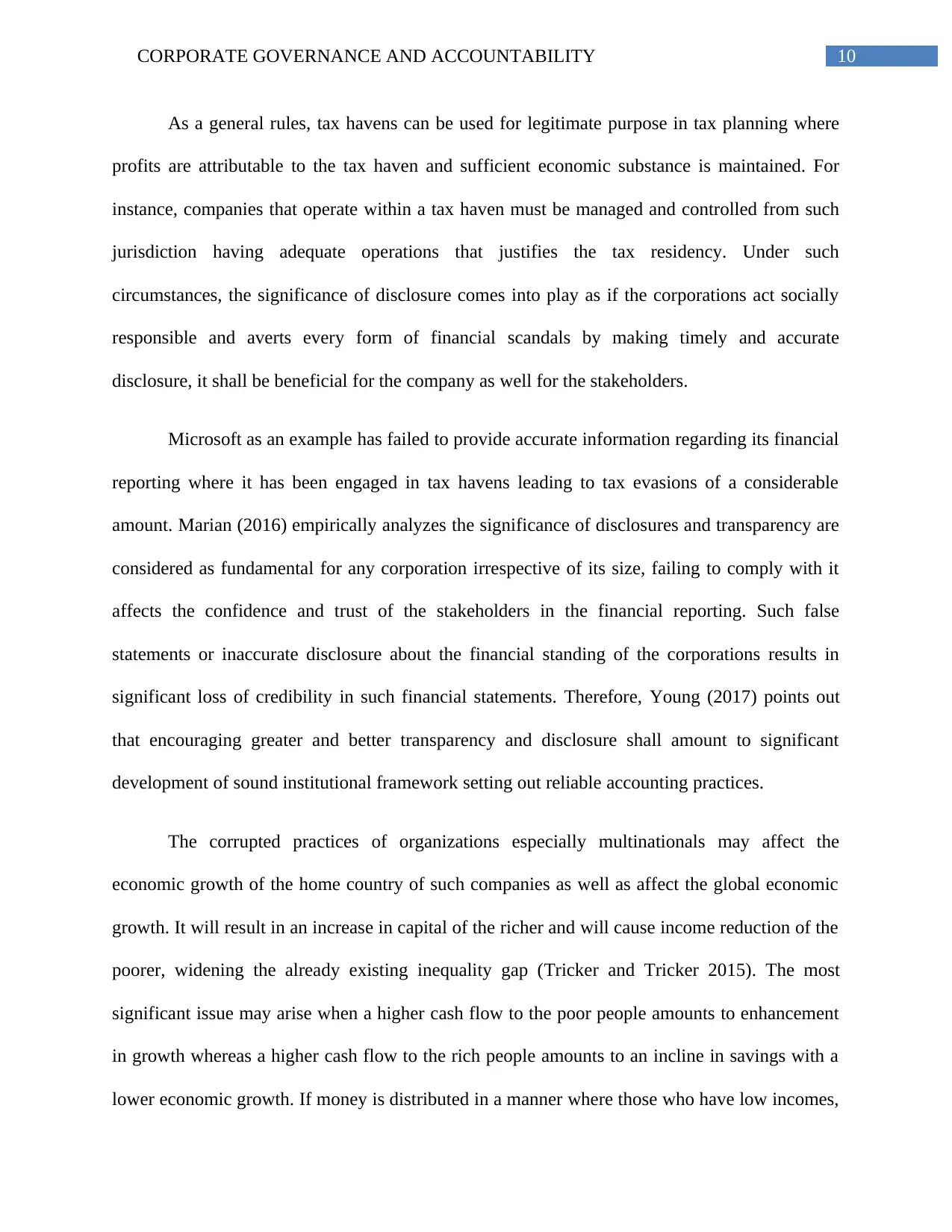
10CORPORATE GOVERNANCE AND ACCOUNTABILITY
As a general rules, tax havens can be used for legitimate purpose in tax planning where
profits are attributable to the tax haven and sufficient economic substance is maintained. For
instance, companies that operate within a tax haven must be managed and controlled from such
jurisdiction having adequate operations that justifies the tax residency. Under such
circumstances, the significance of disclosure comes into play as if the corporations act socially
responsible and averts every form of financial scandals by making timely and accurate
disclosure, it shall be beneficial for the company as well for the stakeholders.
Microsoft as an example has failed to provide accurate information regarding its financial
reporting where it has been engaged in tax havens leading to tax evasions of a considerable
amount. Marian (2016) empirically analyzes the significance of disclosures and transparency are
considered as fundamental for any corporation irrespective of its size, failing to comply with it
affects the confidence and trust of the stakeholders in the financial reporting. Such false
statements or inaccurate disclosure about the financial standing of the corporations results in
significant loss of credibility in such financial statements. Therefore, Young (2017) points out
that encouraging greater and better transparency and disclosure shall amount to significant
development of sound institutional framework setting out reliable accounting practices.
The corrupted practices of organizations especially multinationals may affect the
economic growth of the home country of such companies as well as affect the global economic
growth. It will result in an increase in capital of the richer and will cause income reduction of the
poorer, widening the already existing inequality gap (Tricker and Tricker 2015). The most
significant issue may arise when a higher cash flow to the poor people amounts to enhancement
in growth whereas a higher cash flow to the rich people amounts to an incline in savings with a
lower economic growth. If money is distributed in a manner where those who have low incomes,
As a general rules, tax havens can be used for legitimate purpose in tax planning where
profits are attributable to the tax haven and sufficient economic substance is maintained. For
instance, companies that operate within a tax haven must be managed and controlled from such
jurisdiction having adequate operations that justifies the tax residency. Under such
circumstances, the significance of disclosure comes into play as if the corporations act socially
responsible and averts every form of financial scandals by making timely and accurate
disclosure, it shall be beneficial for the company as well for the stakeholders.
Microsoft as an example has failed to provide accurate information regarding its financial
reporting where it has been engaged in tax havens leading to tax evasions of a considerable
amount. Marian (2016) empirically analyzes the significance of disclosures and transparency are
considered as fundamental for any corporation irrespective of its size, failing to comply with it
affects the confidence and trust of the stakeholders in the financial reporting. Such false
statements or inaccurate disclosure about the financial standing of the corporations results in
significant loss of credibility in such financial statements. Therefore, Young (2017) points out
that encouraging greater and better transparency and disclosure shall amount to significant
development of sound institutional framework setting out reliable accounting practices.
The corrupted practices of organizations especially multinationals may affect the
economic growth of the home country of such companies as well as affect the global economic
growth. It will result in an increase in capital of the richer and will cause income reduction of the
poorer, widening the already existing inequality gap (Tricker and Tricker 2015). The most
significant issue may arise when a higher cash flow to the poor people amounts to enhancement
in growth whereas a higher cash flow to the rich people amounts to an incline in savings with a
lower economic growth. If money is distributed in a manner where those who have low incomes,
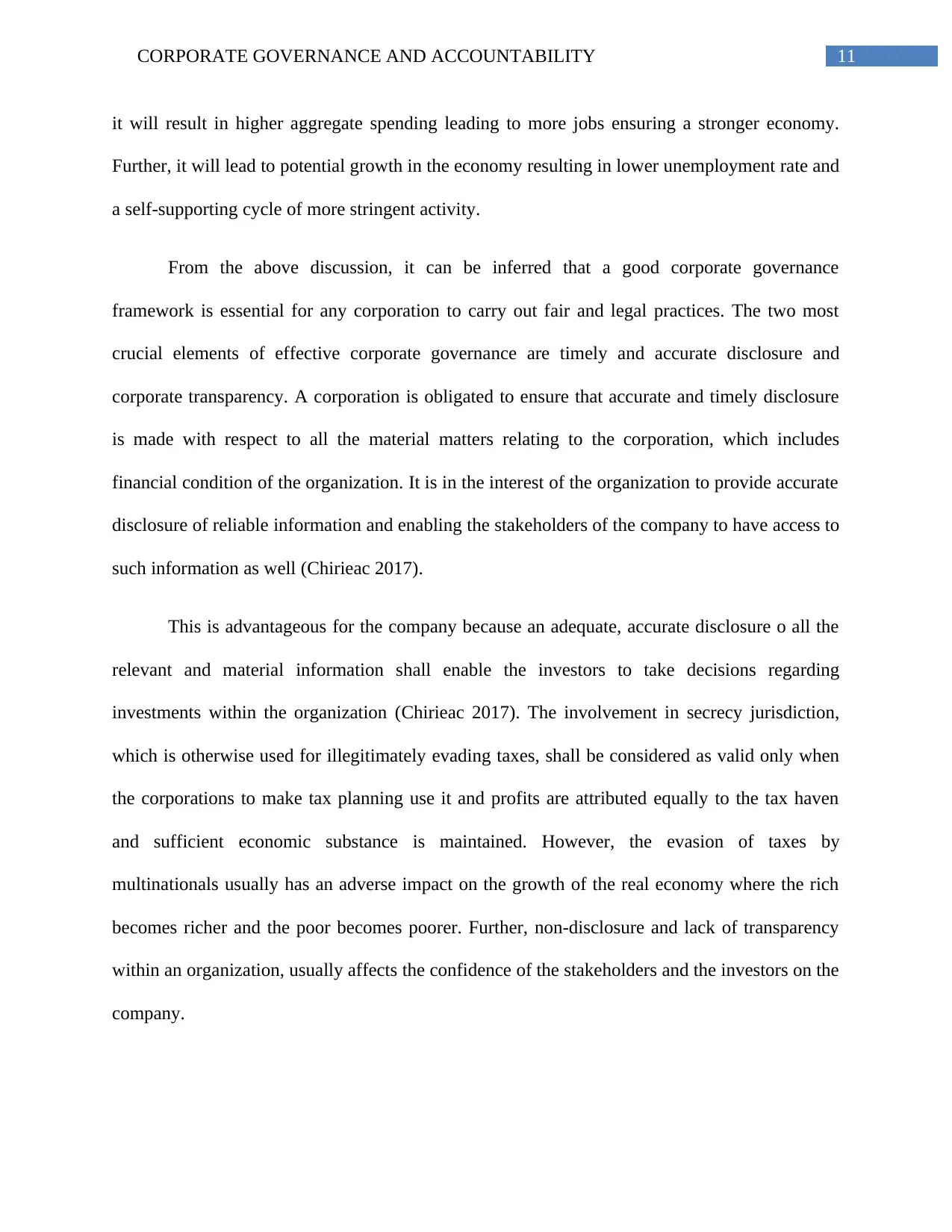
11CORPORATE GOVERNANCE AND ACCOUNTABILITY
it will result in higher aggregate spending leading to more jobs ensuring a stronger economy.
Further, it will lead to potential growth in the economy resulting in lower unemployment rate and
a self-supporting cycle of more stringent activity.
From the above discussion, it can be inferred that a good corporate governance
framework is essential for any corporation to carry out fair and legal practices. The two most
crucial elements of effective corporate governance are timely and accurate disclosure and
corporate transparency. A corporation is obligated to ensure that accurate and timely disclosure
is made with respect to all the material matters relating to the corporation, which includes
financial condition of the organization. It is in the interest of the organization to provide accurate
disclosure of reliable information and enabling the stakeholders of the company to have access to
such information as well (Chirieac 2017).
This is advantageous for the company because an adequate, accurate disclosure o all the
relevant and material information shall enable the investors to take decisions regarding
investments within the organization (Chirieac 2017). The involvement in secrecy jurisdiction,
which is otherwise used for illegitimately evading taxes, shall be considered as valid only when
the corporations to make tax planning use it and profits are attributed equally to the tax haven
and sufficient economic substance is maintained. However, the evasion of taxes by
multinationals usually has an adverse impact on the growth of the real economy where the rich
becomes richer and the poor becomes poorer. Further, non-disclosure and lack of transparency
within an organization, usually affects the confidence of the stakeholders and the investors on the
company.
it will result in higher aggregate spending leading to more jobs ensuring a stronger economy.
Further, it will lead to potential growth in the economy resulting in lower unemployment rate and
a self-supporting cycle of more stringent activity.
From the above discussion, it can be inferred that a good corporate governance
framework is essential for any corporation to carry out fair and legal practices. The two most
crucial elements of effective corporate governance are timely and accurate disclosure and
corporate transparency. A corporation is obligated to ensure that accurate and timely disclosure
is made with respect to all the material matters relating to the corporation, which includes
financial condition of the organization. It is in the interest of the organization to provide accurate
disclosure of reliable information and enabling the stakeholders of the company to have access to
such information as well (Chirieac 2017).
This is advantageous for the company because an adequate, accurate disclosure o all the
relevant and material information shall enable the investors to take decisions regarding
investments within the organization (Chirieac 2017). The involvement in secrecy jurisdiction,
which is otherwise used for illegitimately evading taxes, shall be considered as valid only when
the corporations to make tax planning use it and profits are attributed equally to the tax haven
and sufficient economic substance is maintained. However, the evasion of taxes by
multinationals usually has an adverse impact on the growth of the real economy where the rich
becomes richer and the poor becomes poorer. Further, non-disclosure and lack of transparency
within an organization, usually affects the confidence of the stakeholders and the investors on the
company.
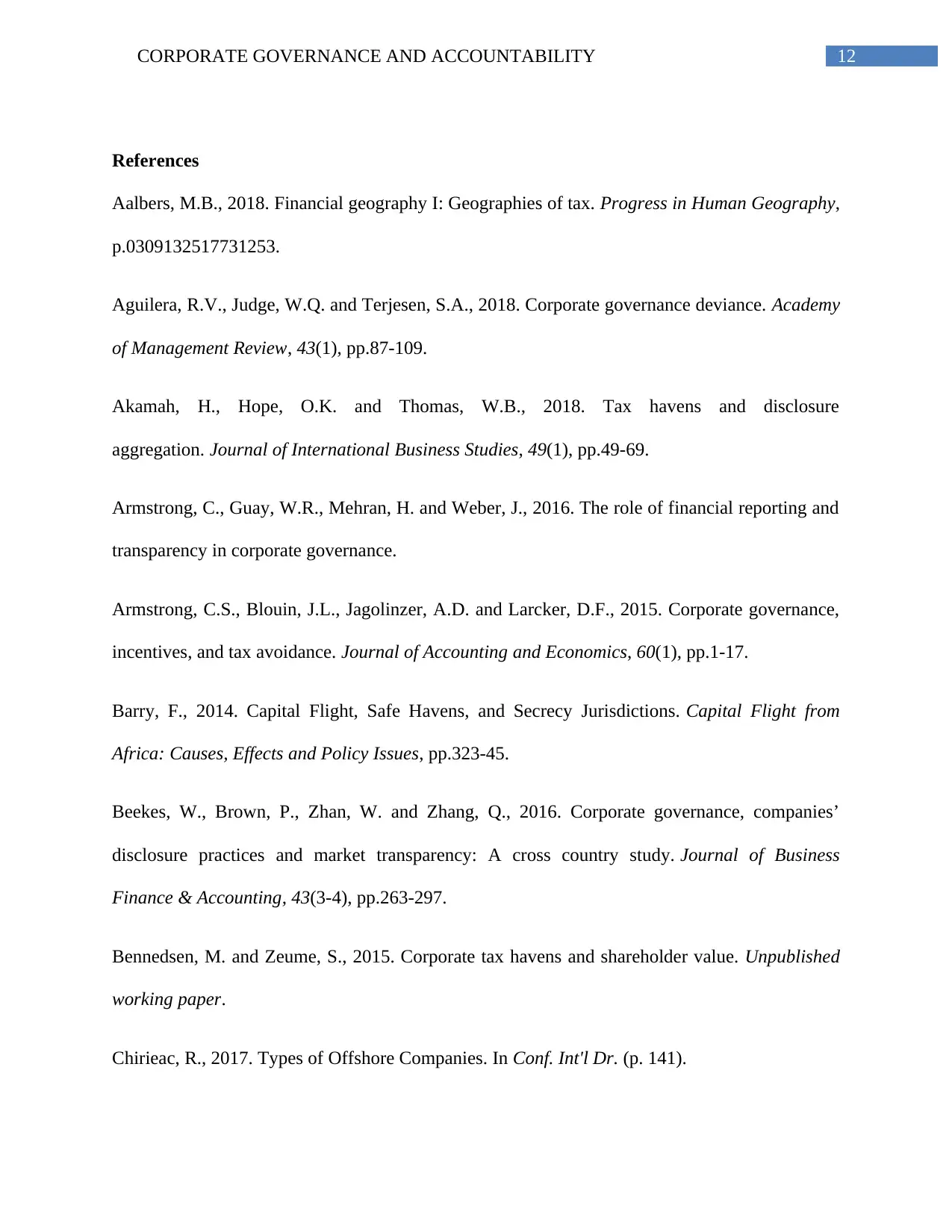
12CORPORATE GOVERNANCE AND ACCOUNTABILITY
References
Aalbers, M.B., 2018. Financial geography I: Geographies of tax. Progress in Human Geography,
p.0309132517731253.
Aguilera, R.V., Judge, W.Q. and Terjesen, S.A., 2018. Corporate governance deviance. Academy
of Management Review, 43(1), pp.87-109.
Akamah, H., Hope, O.K. and Thomas, W.B., 2018. Tax havens and disclosure
aggregation. Journal of International Business Studies, 49(1), pp.49-69.
Armstrong, C., Guay, W.R., Mehran, H. and Weber, J., 2016. The role of financial reporting and
transparency in corporate governance.
Armstrong, C.S., Blouin, J.L., Jagolinzer, A.D. and Larcker, D.F., 2015. Corporate governance,
incentives, and tax avoidance. Journal of Accounting and Economics, 60(1), pp.1-17.
Barry, F., 2014. Capital Flight, Safe Havens, and Secrecy Jurisdictions. Capital Flight from
Africa: Causes, Effects and Policy Issues, pp.323-45.
Beekes, W., Brown, P., Zhan, W. and Zhang, Q., 2016. Corporate governance, companies’
disclosure practices and market transparency: A cross country study. Journal of Business
Finance & Accounting, 43(3-4), pp.263-297.
Bennedsen, M. and Zeume, S., 2015. Corporate tax havens and shareholder value. Unpublished
working paper.
Chirieac, R., 2017. Types of Offshore Companies. In Conf. Int'l Dr. (p. 141).
References
Aalbers, M.B., 2018. Financial geography I: Geographies of tax. Progress in Human Geography,
p.0309132517731253.
Aguilera, R.V., Judge, W.Q. and Terjesen, S.A., 2018. Corporate governance deviance. Academy
of Management Review, 43(1), pp.87-109.
Akamah, H., Hope, O.K. and Thomas, W.B., 2018. Tax havens and disclosure
aggregation. Journal of International Business Studies, 49(1), pp.49-69.
Armstrong, C., Guay, W.R., Mehran, H. and Weber, J., 2016. The role of financial reporting and
transparency in corporate governance.
Armstrong, C.S., Blouin, J.L., Jagolinzer, A.D. and Larcker, D.F., 2015. Corporate governance,
incentives, and tax avoidance. Journal of Accounting and Economics, 60(1), pp.1-17.
Barry, F., 2014. Capital Flight, Safe Havens, and Secrecy Jurisdictions. Capital Flight from
Africa: Causes, Effects and Policy Issues, pp.323-45.
Beekes, W., Brown, P., Zhan, W. and Zhang, Q., 2016. Corporate governance, companies’
disclosure practices and market transparency: A cross country study. Journal of Business
Finance & Accounting, 43(3-4), pp.263-297.
Bennedsen, M. and Zeume, S., 2015. Corporate tax havens and shareholder value. Unpublished
working paper.
Chirieac, R., 2017. Types of Offshore Companies. In Conf. Int'l Dr. (p. 141).
Paraphrase This Document
Need a fresh take? Get an instant paraphrase of this document with our AI Paraphraser
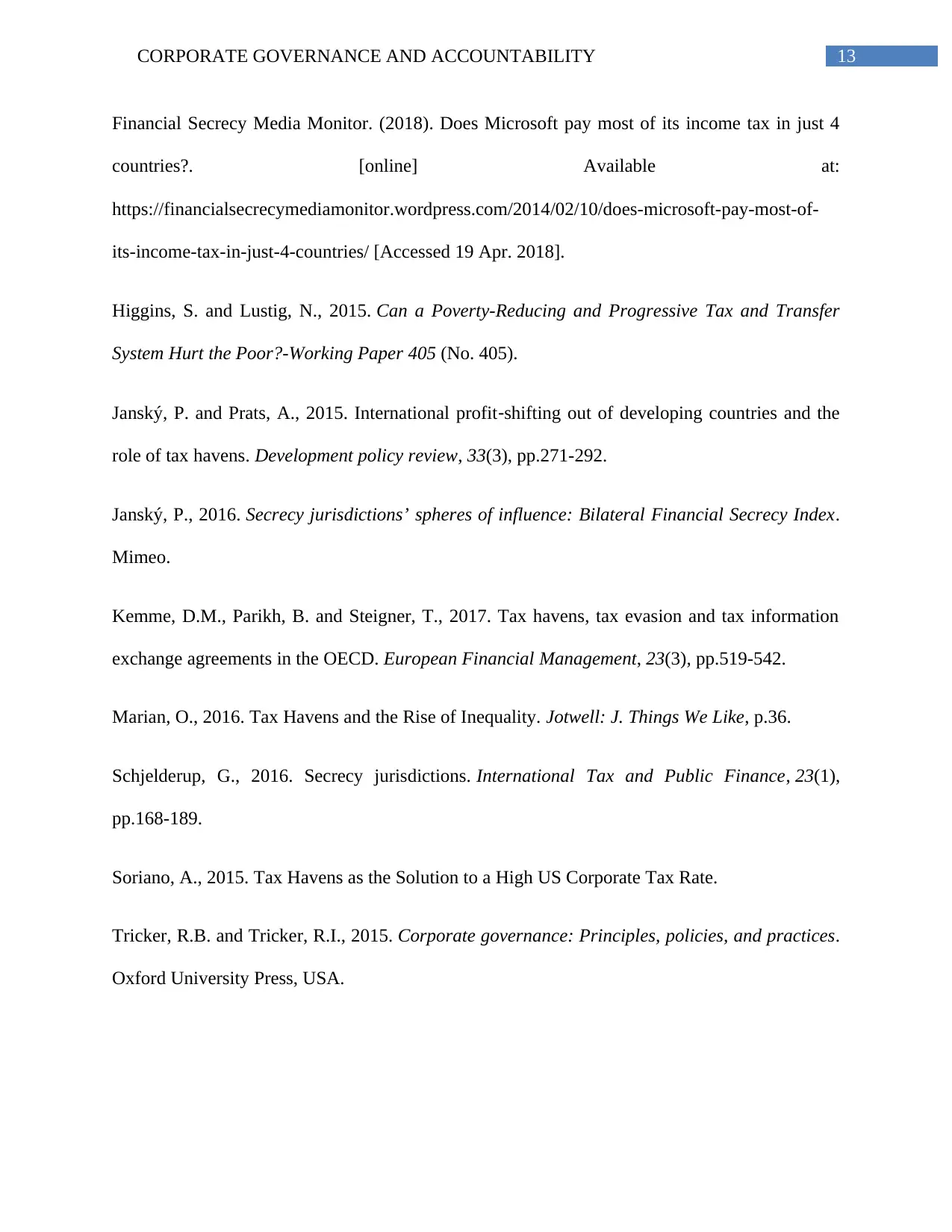
13CORPORATE GOVERNANCE AND ACCOUNTABILITY
Financial Secrecy Media Monitor. (2018). Does Microsoft pay most of its income tax in just 4
countries?. [online] Available at:
https://financialsecrecymediamonitor.wordpress.com/2014/02/10/does-microsoft-pay-most-of-
its-income-tax-in-just-4-countries/ [Accessed 19 Apr. 2018].
Higgins, S. and Lustig, N., 2015. Can a Poverty-Reducing and Progressive Tax and Transfer
System Hurt the Poor?-Working Paper 405 (No. 405).
Janský, P. and Prats, A., 2015. International profit‐shifting out of developing countries and the
role of tax havens. Development policy review, 33(3), pp.271-292.
Janský, P., 2016. Secrecy jurisdictions’ spheres of influence: Bilateral Financial Secrecy Index.
Mimeo.
Kemme, D.M., Parikh, B. and Steigner, T., 2017. Tax havens, tax evasion and tax information
exchange agreements in the OECD. European Financial Management, 23(3), pp.519-542.
Marian, O., 2016. Tax Havens and the Rise of Inequality. Jotwell: J. Things We Like, p.36.
Schjelderup, G., 2016. Secrecy jurisdictions. International Tax and Public Finance, 23(1),
pp.168-189.
Soriano, A., 2015. Tax Havens as the Solution to a High US Corporate Tax Rate.
Tricker, R.B. and Tricker, R.I., 2015. Corporate governance: Principles, policies, and practices.
Oxford University Press, USA.
Financial Secrecy Media Monitor. (2018). Does Microsoft pay most of its income tax in just 4
countries?. [online] Available at:
https://financialsecrecymediamonitor.wordpress.com/2014/02/10/does-microsoft-pay-most-of-
its-income-tax-in-just-4-countries/ [Accessed 19 Apr. 2018].
Higgins, S. and Lustig, N., 2015. Can a Poverty-Reducing and Progressive Tax and Transfer
System Hurt the Poor?-Working Paper 405 (No. 405).
Janský, P. and Prats, A., 2015. International profit‐shifting out of developing countries and the
role of tax havens. Development policy review, 33(3), pp.271-292.
Janský, P., 2016. Secrecy jurisdictions’ spheres of influence: Bilateral Financial Secrecy Index.
Mimeo.
Kemme, D.M., Parikh, B. and Steigner, T., 2017. Tax havens, tax evasion and tax information
exchange agreements in the OECD. European Financial Management, 23(3), pp.519-542.
Marian, O., 2016. Tax Havens and the Rise of Inequality. Jotwell: J. Things We Like, p.36.
Schjelderup, G., 2016. Secrecy jurisdictions. International Tax and Public Finance, 23(1),
pp.168-189.
Soriano, A., 2015. Tax Havens as the Solution to a High US Corporate Tax Rate.
Tricker, R.B. and Tricker, R.I., 2015. Corporate governance: Principles, policies, and practices.
Oxford University Press, USA.
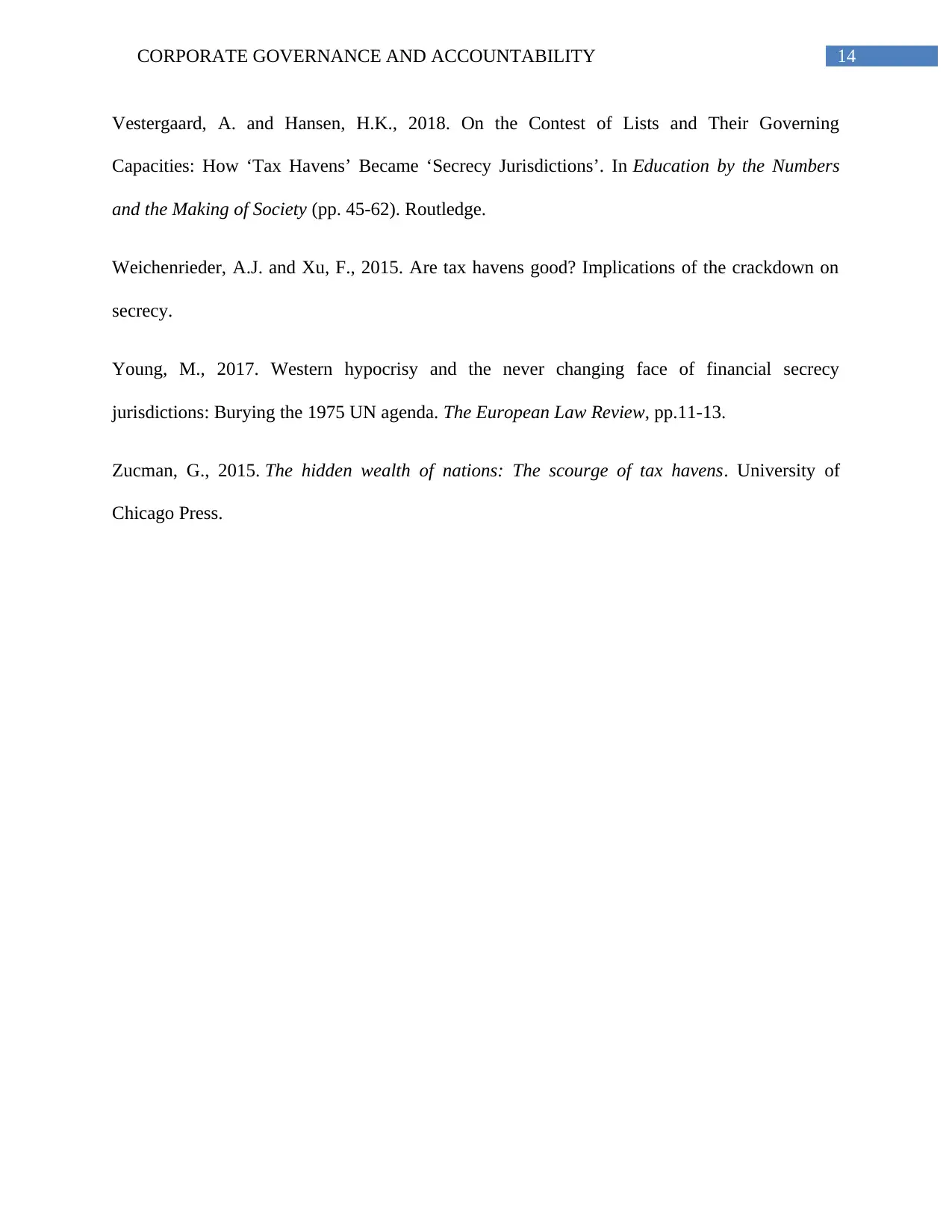
14CORPORATE GOVERNANCE AND ACCOUNTABILITY
Vestergaard, A. and Hansen, H.K., 2018. On the Contest of Lists and Their Governing
Capacities: How ‘Tax Havens’ Became ‘Secrecy Jurisdictions’. In Education by the Numbers
and the Making of Society (pp. 45-62). Routledge.
Weichenrieder, A.J. and Xu, F., 2015. Are tax havens good? Implications of the crackdown on
secrecy.
Young, M., 2017. Western hypocrisy and the never changing face of financial secrecy
jurisdictions: Burying the 1975 UN agenda. The European Law Review, pp.11-13.
Zucman, G., 2015. The hidden wealth of nations: The scourge of tax havens. University of
Chicago Press.
Vestergaard, A. and Hansen, H.K., 2018. On the Contest of Lists and Their Governing
Capacities: How ‘Tax Havens’ Became ‘Secrecy Jurisdictions’. In Education by the Numbers
and the Making of Society (pp. 45-62). Routledge.
Weichenrieder, A.J. and Xu, F., 2015. Are tax havens good? Implications of the crackdown on
secrecy.
Young, M., 2017. Western hypocrisy and the never changing face of financial secrecy
jurisdictions: Burying the 1975 UN agenda. The European Law Review, pp.11-13.
Zucman, G., 2015. The hidden wealth of nations: The scourge of tax havens. University of
Chicago Press.
1 out of 15
Related Documents
Your All-in-One AI-Powered Toolkit for Academic Success.
+13062052269
info@desklib.com
Available 24*7 on WhatsApp / Email
![[object Object]](/_next/static/media/star-bottom.7253800d.svg)
Unlock your academic potential
© 2024 | Zucol Services PVT LTD | All rights reserved.




